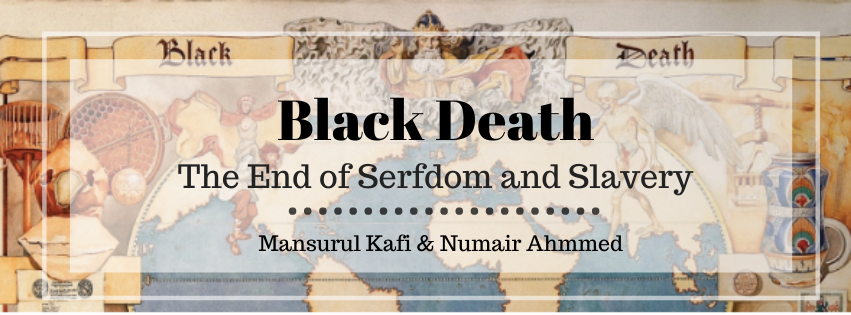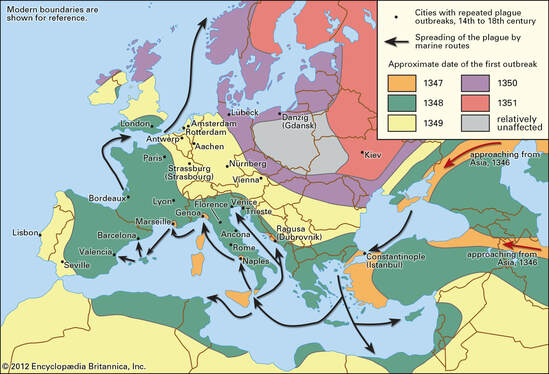ECONOMICS STUDY CENTER, UNIVERSITY OF DHAKA
|
Mansurul Kafi, Numair Ahmmed Black Death - one of the most catastrophic events in the history of mankind - was an epidemic of plague which made massive changes in the course of European history. The term Black Death actually originated from the mistranslation of the Latin word ‘atra’ which means both terrible and black. The major outbreak of plague throughout Europe diminished about one third of the continent's population. It was mainly an epidemic of bubonic plague that changed the social and economic features of the infected regions. The Black Death became the most significant event of the mid-fourteenth century, incurring heavy losses on the development of human civilization. Also known as the “black plague”, this epidemic originated in Central Asia, especially in the dry plains of China, Mongolia and other mid Asian countries. Caused by a bacterium called Yersinia pestis, the disease was carried by various types of rodents, especially the black rat. It moved along the Silk Road and gradually spread throughout Europe. Through traders arriving from Asian central plains, the plague reached Crimea in 1347. This was the first reported outbreak in Europe. The Mongolian invasion of Crimea also played an important role in this event. Over time, the disease travelled to the port cities of Europe and then to other parts of the continent, continuing until 1352. Besides rodents and fleas, the merchant fleets arriving in the European ports of Messina, Venice, Genoa from Crimea also carried out this plague. The port cities were the starting point of devastation. It reached Constantinople, the heart of Eastern Roman empire, and then the Middle East and North Africa. Within a year, western Europe and the Scandinavian region became infected. The main reasons were obviously the merchant fleets, which transferred the disease from port to port and city to city. Casualties of the Black Death were innumerable. From 1347 to 1352, it swept out almost 25 million people in Europee - about one third of the population of the continent. It also killed more than 50 million in the Asian region. The epidemic washed out the cattle population (mostly -sheep) and marked itself as one of the most deadly outbreaks of bubonic plague. Filthy living conditions, lack of hygiene, stagnation of medical knowledge, famine and outbreak of other diseases also contributed to the lethality of the plague.There are three types of plague, and all were likely present in the pandemic. Bubonic plague, the most common during the outbreak, causes severe swelling in the groin and armpits (the lymph nodes) which takes on a sickening black colour. Other symptoms were fever and joint pain. The disease was terrifyingly contagious; the mere touching of the clothes of an infected person could transfer the malady to the toucher. As medical doctors were neither able to comprehend the nature of the disease nor how it was spreading, they relied on crude and unsophisticated techniques such as bloodletting and boil lancing (practices that were dangerous and unsanitary), and even extreme superstitious practices such as bathing in urine or keeping dead animals in the house. Meanwhile, healthy people did all they could to avoid the sick. Many fled the cities to the countryside but even there they could not escape the disease. As people fled in panic whenever a case of plague broke out, they unknowingly carried the disease with them and spread it even further. With so many dead and dying, the order of the medieval society was disrupted. People were set against each other; law and order, and essential services had collapsed. A sense of paranoia and hopelessness permeated throughout Europe. People reacted differently to this mysterious disease. Some turned to debauchery and immoral behaviour. Religious zeal and fanaticism were thought to be the solution by some. As people had no idea how to stop the pestilence, they started to make a scapegoat of minorities. Christians accused Jews of poisoning public water supplies. The spread of rumour led to the massacre of Jews. In some places entire Jewish communities were killed by mobs or burned at stakes. Flagellantism - the practice of self inflicted pain especially with a whip - became popular as a radical movement during the period although it was deemed heretical by the church. Even though many people believed the plague to be the end of the world, life eventually went on. Besides the social impacts, there were far reaching economic effects. Before the outbreak of the plague, Europe was overpopulated and there was a shortage of lands. However, after the death of so many people, there was a drastic reduction in production and consumption. Landlords were compelled to pay higher wages and provide better workplace conditions. Furthermore, land prices fell, per capita income increased, and there were more food for average peasants. These changes prompted more fluidity to the rigid structures of the medieval society. The Black Death disrupted society to such an extent that some historians believe that it contributed to the Renaissance. Regardless of what significant role it played in the Renaissance, the Black Death fundamentally changed life for people across the world. It is, and will always be remembered as one of the worst pandemics in human history. Reference:
 Mansurul Kafi A chronic procrastinator whose childhood dream was to be a pokemon master. Apart from listening to obscure music he likes to spend his time playing rpg.  Numair Ahmmed Numair is constantly trying to find some interest in economics. He loves to read books and watch documentaries, and has a special interest in history.
1 Comment
Super Galaxias
11/8/2022 11:00:53 am
Hey, you didn't actually talk about Black Death being the end of slavery and serfdom. You may want to change the title or info to be more related to your topic. The info you had was great but didn't relate to the topic you said in the title.
Reply
Leave a Reply. |
Send your articles to: |



